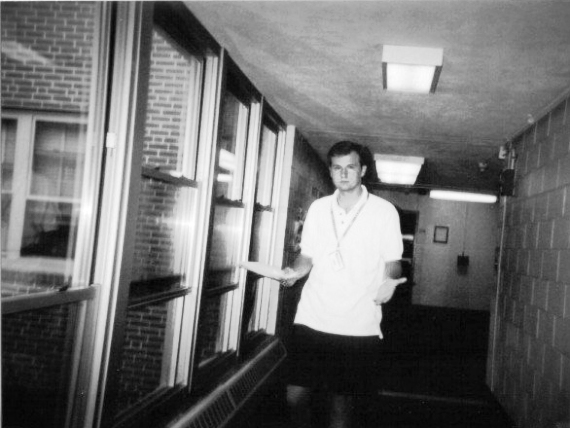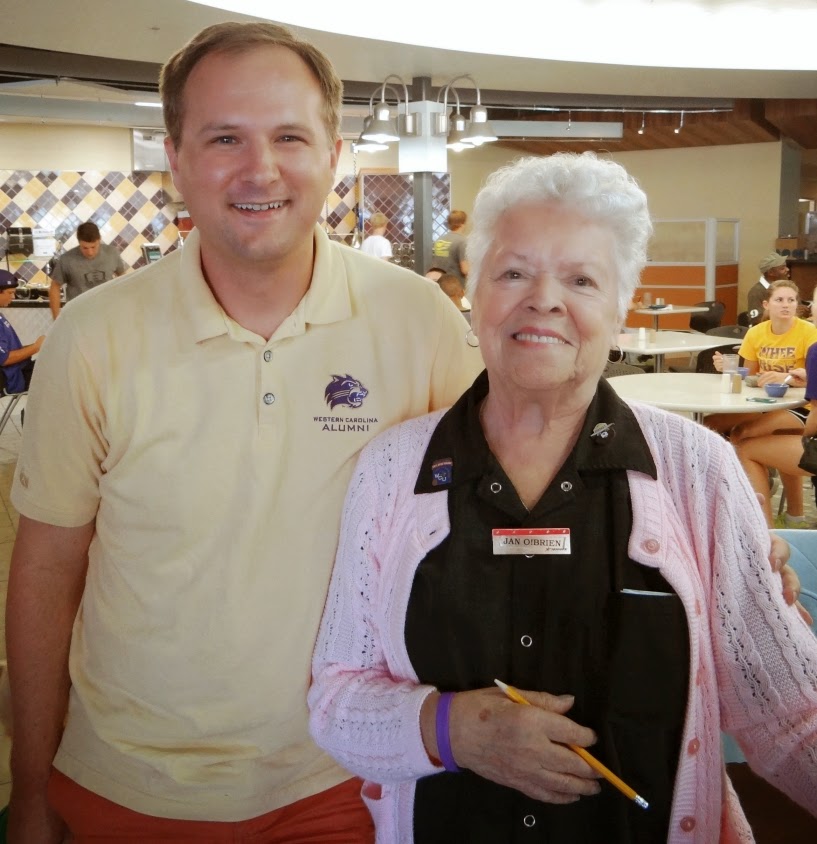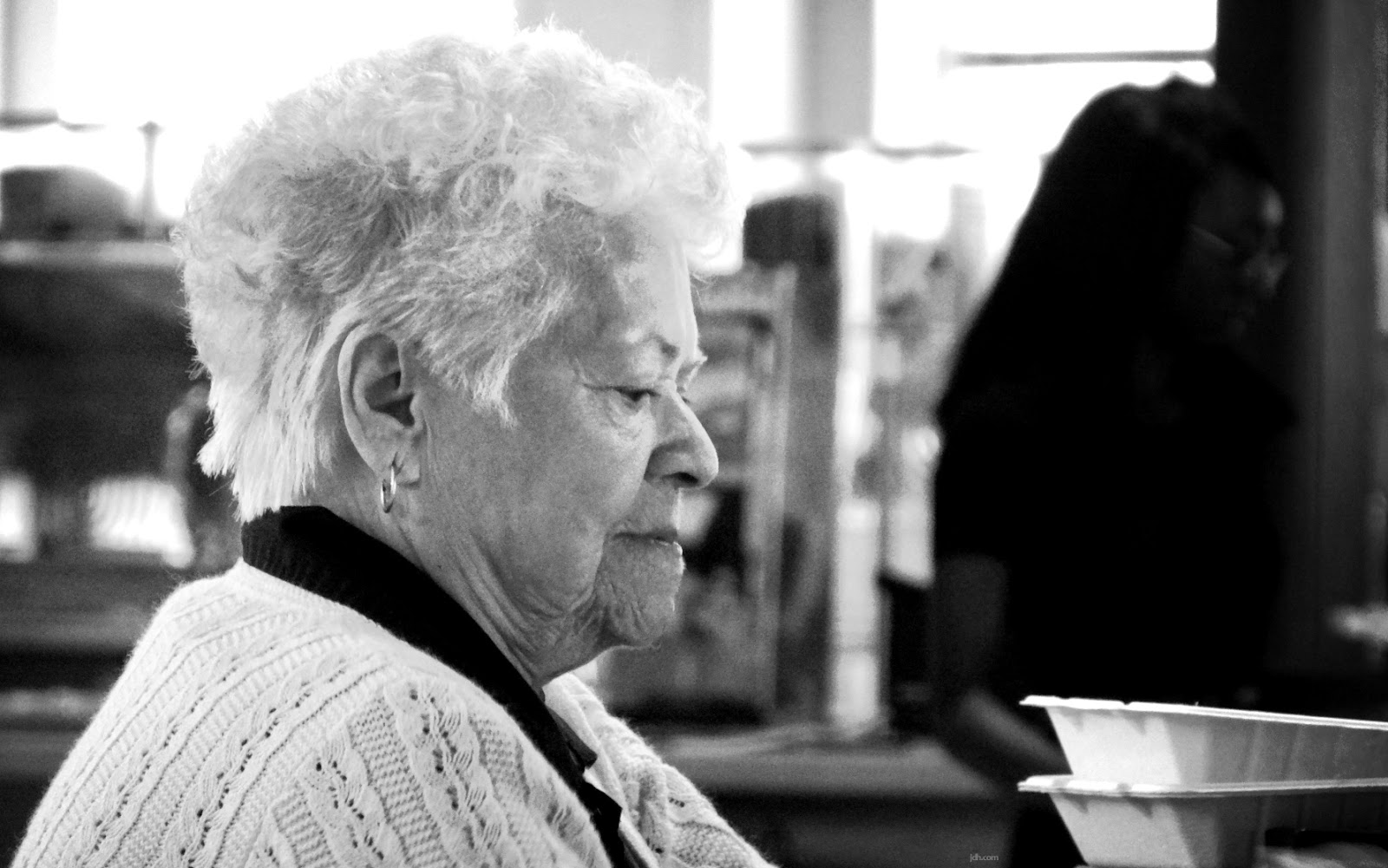IN MEMORIAM
UPDATE, DECEMBER 5, 2016: Western Carolina University announced today that Jan O’Brien had passed away. It’s important to note this story is about the summer of 2014, when Jan’s passing was erroneously reported.
Jan will always be a cherished part of my college years, and I am deeply saddened to hear she’s passed away. I will always be grateful, however, of the chance I got to tell her how important she was to so many of us before it was too late. –jdh
A journey to say goodbye to a campus legend–before it’s too late.
THIS STORY BEGINS SIXTEEN YEARS AGO, the fall of 1998, when I was a high school senior visiting my college sophomore girlfriend at Western Carolina. We were kids, so we were drawn like moths to the flame by the on-campus Chick-fil-a, where fried chicken sandwiches wrapped in foil bags sat under heat lamps, waiting for us to collect them and pay for them with a mysterious and seemingly inexhaustible supply of declining balance points.
We’d gathered our meals and headed for check-out, and that’s the first time I met Jan O’Brien, the infamous register attendant in the University Center food court. She was an older lady, short but strong stature, white, curly hair, and a vibrant smile, which she flashed warmly to me. “Hello, sweetheart!” she said.
“Hi, Jan!” Kelly said back to her.
I grinned. “What, no ‘sweetheart’ for me?”
She laughed, and then she called me sweetheart. We chatted, and then we checked out, and we ate, and the next year I came back to Western Carolina as a freshman. Jan was still there, and she called me sweetheart. She called me that for the next four years.
Flash forward eleven years past my college graduation, past the marriage and the first job, the first and second houses, past the births of two kids, and all the way to this week. Thursday night. Kelly and I were settling down for the evening, ready for the kids to go to sleep.
We were minding our typical nighttime routines, scrolling on our phones through Facebook, when I saw it–a friend, upset, sharing terrible news. Jan O’Brien had died.
I gasped, and read the status update again. I told Kelly. And slowly, grief dripped over us. There it was again on Facebook. I re-posted it again, anxious to share the news to my circle of friends, each who shared stories about Jan. I watched as the comments came in.
We put the kids to bed, and then Kelly and I sat in our living room, the lights dim, and talked about her, about her laugh, her smile, her eternally sunny attitude.
I remembered spring semesters best. Jan would always take trips abroad in the summers, and in the spring she’d work on learning the language for wherever she was traveling. The first spring it was Mandarin, and I learned about the importance of inflections. I learned to say hello, and I learned to say “not bad, how are you?” And that was about it.
Another spring it was Greek, and every morning I’d check out with my breakfast, and every morning she’d teach me a little phrase, something about saying hello and how are you, then something about food or drink, then something about finding the restroom.
No matter what, every morning it was “Hello, Sweetheart!” It didn’t matter that I was a goofy college kid with a backpack full of English literature anthologies, my hair a little long, my head somewhere else. Sweetheart.
A few years ago when Kelly and I visited Western for a football game, we poked our heads into the old dining hall one more time, and we saw Jan’s register station–a bulletin board filled with photos of Jan with students. Jan wasn’t working that day.
That was it. We never saw her again. They tore down the dining hall the next year.
Every quarter or so, when the alumni magazine arrives, I flip to the back, where they list the University deaths. It’s a morbid habit, glancing through to see if a professor has passed away. I always wondered if I’d spot Jan’s name in the listings.
But here it was, flashing across Facebook like wildfire now, dozens of friends liking and sharing, commenting and mourning. O’Malley’s Pub, one of the few bars in Sylva from our college years that’s still open, posted its own mournful statement. I imagined them opening up a bottle of Irish whiskey, pouring shots for all the folks at the bar, and toasting Jan’s good life.
In college, there are friends who are like brothers, and there are professors who are like second parents. And then there are people like Jan, the kind who are like your grandmothers, so sweet and happy and fun to be around.
I picked up my phone and wrote an email to the Chancellor, encouraging him to find a good way to honor her. He quickly wrote back:
“James, I had not heard. I just saw her Monday or Tuesday in the dining hall.”

Friday morning, and I’m pulling on my clothes for work. The haze of Thursday night’s grief is still lingering. First, it was Robin Williams, and now it’s Jan, I thought. No fun.
I checked Facebook, curious to see the comments posted after I’d gone to sleep. I noticed a friend had created a fan page called “Remembering Jan O’Brien.”
That’s when I noticed a comment, this one on the O’Malley’s post, featuring a screenshot of a text message from someone working in dining services: “Miss Jan is alive and well and at her post, ready to meet all the new students.” And then, another post, confirming the first. And another.
Jan was alive. My mind raced through a hundred thoughts, each clouded by confusion. If she was alive–and at that point, the whole matter still seemed a big if–then, what? What happens when you’re ready to eulogize someone, and you find out there’s still a chance to say those words in person?
Before I knew it, we were feeding the kids breakfast, packing a bunch of snacks into sandwich baggies, and loading up the minivan. We were heading west.
Cullowhee, I’ve often joked, isn’t a place you find by accident. The best way to get there, I figure, is to go to the end of North Carolina and turn left. There, you’ll find Western Carolina.
We followed Interstate 40, the sun to our backs, through the rolling Piedmont to where the land bunches up into well-worn creases, mountains old and covered, until the highway can’t go straight anymore and gives into a snaking cadence of curves and climbs, all the way to the near-end of the Tarheel mile markers. We turned just before Tennessee to go south.
The names of the places here are different from the place names back east: Junaluska, Cataloochee, Balsam, Cullowhee, Nantahala, places more ancient than the old languages used to call them, their origins as dark as the noon woods through the valley.
Our drive is long enough that there comes a point where I feel more than a little foolish. I have dragged my entire family on a day trip to the mountains to go see a lady who works in a college cafeteria who I thought was dead but isn’t, I thought. I was overwhelmed by the feeling that I was embarking on some mid-life crisis adventure, the kind in which the protagonist goes off in search for a part of his youth that has been lost, some existential pearl that must be recaptured, only to discover it’s long gone, and the lesson is in the journey.
Jan is alive. That part has been well verified by now. The Chancellor even emailed to say so. “Come on over, though!” he wrote. “It’s move-in day!”
Indeed it was. We pulled onto campus with a caravan of cars, each loaded down with first-year students and their possessions, their parents and their angst. We miraculously found a parking space, unloaded the kids, and found bathrooms.
It was time, and I wasn’t even sure about what to say. “Jan! You’re alive!” seemed too dramatic. I quietly wished I’d put more thought into this. But then again, I wasn’t even sure if she was still working. I didn’t know where, exactly, she would be if she was working. Hell, I wasn’t even sure if she was alive twelve hours ago.
Then, there she was: perched on her stool behind her register, a small queue of students handing over their meal cards for her to swipe, the bustle of the dining hall carrying on in concert. She looked up at me. “Hello, sweetheart!” she said, her smile growing bigger as she began to place my face, and then Kelly’s.
She greeted our children, and we spent a few minutes catching up. We snapped a picture together. But there was a line of hungry students who wanted to go and eat, and we were clearly in the way, the awkward college boy grown up with his family and the car-sized stroller blocking most of the lane to get in.
We went in and ate, our kiddos’ eyes agape at the ten thousand square foot buffet. We bumped into Ron Rash. And then we saw Jan on her lunch break, and there was time to talk. This time, I was ready with questions.

She was born in Washington, D.C. She lived in Miami Beach for 35 years and worked as a bartender. “I made good money,” she said, “and I loved the people.” She came to visit friends in nearby Sylva, and she fell in love with the mountains. She belonged here, she said.
But she couldn’t come here to retire, so she picked up her job working in the food court. “I never guessed I would be happy doing a job like this,” she admitted, “but it’s been wonderful. Twenty-five years this year.”
We talked about how she taught me languages and how she traveled. “I can’t do that much anymore. My back is no good. I couldn’t move around or stand in line.” Still, her record isn’t bad: 49 states and 22 countries.
Julia and Thomas puttered around us, occupying their minds as best they could while we talked. “You know, I don’t have any children of my own,” she admitted. “But actually, I have six thousand children. All of these kids are my kids. I love them. They keep me alive. I’ll keep coming here and doing this job until I can’t get out of bed.”
Our conversation now was coming more naturally. I told her about all of the people on Facebook who were devastated when they thought she’d died. She seemed unsure how to react herself. “I came up here for work this morning, and a young woman came up to me, and she saw me, and she turned around crying and left. I didn’t know what to think.”
I told Jan how happy I was to see her, and I said how much she meant to me (and to Kelly) when we were students and how much she meant to so many of us. She was an important part of our lives, I said. “Thank you,” she replied. I thanked her back.
In the end, that was as best as I could do. There was no Hollywood ending, no moment where we ran and embraced while the cafeteria erupted in applause, no grand speeches standing on top of dining tables. Freshmen students wandered past us, unaware of the jewel sitting down for her lunch, blind to the moment we were sharing together.
We hugged goodbye, and I kissed her cheek, and that was that. Before long, we were back in the van, the children asleep in their car seats as we coasted down to flat land. Like death, the whole moment had happened so quickly.
The lesson was in the journey, after all. I was so sad when I thought Jan had left us, but the truth was, I was just as responsible for Jan’s disappearance in my life. I’d quit stopping by the dining hall to see her, resigning Jan to a checklist of college memories shared among my friends.
And then it was like God told me to go hug her neck, and I felt like I had to. I really did. It might seem emotional and silly at first glance to go and drive a hundred fifty miles to find Jan, but I didn’t think I had a choice.
Because I had to prove that I live in a world in which human beings matter, a world in which the emotion following death is more than a Facebook lamentation, more than a status update and an oh-well. I was compelled to share the flood of memories when I thought Jan was gone, and part of me felt that none of those feelings was real–was true–if I didn’t take the initiative and go find her.
Yes, this is a story about letting people in your life slide to the far perimeters, and yes, this is about letting people in your life know how much they mean to you.
But this is also about the hard reality of living and moving forward, about how there comes a point when you have a lot of people in your life–or only a precious few–and one day leads to another, and you wake up to find you’ve had to let some people go, that they’ve wandered into that far-away place, and that it’s okay. That’s how life works.
“The report of my death was an exaggeration,” Mark Twain famously wrote in the New York Journal after he had mistakenly been declared dead by the media. So it was with Jan.
As it turns out, we share a birthday. This month I’ll turn 33. She’ll turn 82. This year, Western Carolina turns 125. And as a new flock of students arrives, Jan will be there to learn their names, to call them sweetheart, and give them advice, and share her brilliant smile.
In short, she’ll be there to change their lives. Still.
I was quite humbled when WCU Magazine republished this piece in their Winter 2015 edition. Find that here, and read more about Jan in this 2009 article in the WCU Reporter.






Leave a Reply